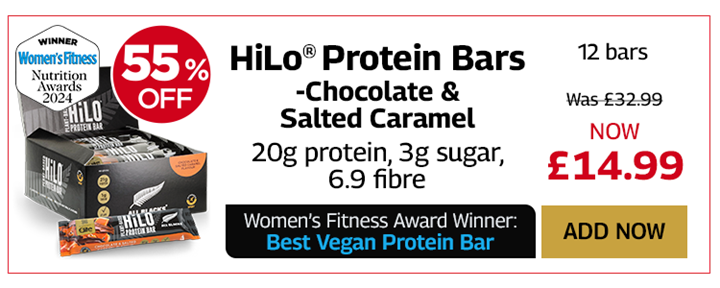Rob Hobson, Nutritionist, explains what quercetin is, if there are any benefits or, how it may help improve exercise performance and where you can get it from.
What is quercetin?
This yellow pigment is a natural flavonoid found in fruits and vegetables, and is one of the most abundant antioxidants in the diet. Although free radicals have an important role to play in the body, when present in excess they may cause damage. The role of antioxidants is to help protect against this.
What are the potential benefits?
There are many health benefits associated with quercetin. These include reducing inflammation, which is thought to be at the root of many non-communicable diseases, such as those of the heart. It has been shown that in high numbers, free radicals may encourage the activation of genes that promote inflammation.1
Although a little inflammation is needed in the body to help heal or fight infections, it can cause damage when left to persist for a long period of time.
A study of 50 women with rheumatoid arthritis showed that after taking 500mg of quercetin for eight weeks, they had reduced markers for inflammation, including TNFa, compared to those who took the placebo.2
Quercetin may also help to reduce blood pressure. A review of nine studies found that taking 500mg daily reduced blood pressure by around 5.8mm Hg (systolic) and 2.6mm Hg (diastolic).3
Can quercetin help to improve exercise performance?
Sports supplements are commonly used by athletes to help improve performance, and one area of interest is antioxidants.4 A large review of eleven human studies found that taking a supplement of quercetin may improve endurance performance slightly.5
Exercise has many health benefits, but there is a tipping point when the body can potentially become damaged. Exhaustive exercise, as seen in those that compete in sports such as marathon, triathlon, iron man and multi-stage endurance events, can increase the production of reactive oxygen species (ROS), leading to oxidative stress that may induce muscle damage and fatigue.6
Antioxidants
Moderate exercise can act as a stimulator for the body's antioxidant defences,7 but for more prolonged exercise, supplementation may be an effective strategy, especially given the association between oxidative damage and fatigue.8
Improved blood flow
Flavonoids have also been associated with stimulating nitric oxide, which helps blood vessels to dilate, improving blood flow. During exercise this allows for an increase in delivery oxygen and nutrients to muscle cells, and the removal of molecules produced as a product of metabolism, which can encourage fatigue in prolonged exercise.9
Power output
Research linking quercetin to performance has led to mixed results, but one recent study published in the Journal of Sports Science and Medicine found that citrus flavonoid (quercetin) supplements had a positive impact on performance in trained athletes.10
This clinical trial involved 39 trained athletes who were given either 500mg of a customised citrus flavonoid extract, or placebo, for six weeks.
Exercise performance was tested by way of a time-trial test on a cycle ergometer to generate as much power as possible for 10 minutes. After four weeks the absolute power output significantly increased, with 14.9 watts (5% increase) in the supplementation group compared to 3.8 Watts (1.3% increase) in the placebo group. The oxygen to power ratio also significantly decreased in the supplementation group compared to placebo.
This study is the first of its kind to suggest that supplementation of citrus flavonoids can improve exercise performance, as shown by an increase in power output.

Elite Quercetin With Green Tea
Quercetin with green tea extract for enhanced absorption
- 1,000mg natural source quercetin
- 120mg added green tea for enhanced absorption
- Suitable for vegetarians and vegans
Should you take a supplement, and what is the correct dose?
It's not conclusive that taking antioxidant supplements such as quercetin will improve performance during prolonged exercise, but they may be of interest to those involved in endurance sports.
Studies suggest that a daily dose of 1,000mg is beneficial for those taking a quercetin supplement. For those engaged in competitive sport, any supplements much be approved by Informed Sport to be sure they are free of prohibited substances. Look for the Informed Sport logo, as found on the Healthspan Elite range.
There appear to be very few side effects associated with taking quercetin, but it may react with medication such as antibiotics and blood pressure medication.11
What foods contain quercetin?
You can find quercetin in several plant foods, but the levels may differ depending on where and how the fruit or vegetable has been grown. The bioavailability (ability for your body to absorb and use) of quercetin is also poor, but its uptake may be increased in the presence of vitamin C.10
Foods high in quercetin include:
- Capers
- Red and yellow peppers
- Onions
- Asparagus (cooked)
- Tomatoes
- Red apples
- Broccoli
- Kale
- Red leaf lettuce such as radicchio
- Berries
- Green tea
Quercetin is a powerful antioxidant that has several health benefits, particularly when it comes to inflammation in the body. Although the evidence is not conclusive, it may be of benefit for endurance athletes to consider using quercetin to help improve performance. If you are considering taking a supplement, try it for a couple of months at first, then take a break to help review its effectiveness.









